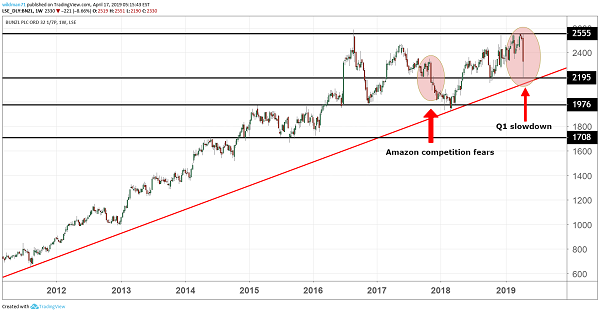Bunzl correction: Warning or opportunity?
A reliable performer over the long term, investors are now questioning Bunzl following a sales slowdown.
17th April 2019 13:27
by Graeme Evans from interactive investor
A reliable performer over the long term, investors are now questioning Bunzl following a sales slowdown.

The trouble with being steady and dependable - as everyone likes to describe Bunzl (LSE:BNZL) - is that the merest whiff of uncertainty can easily knock shares out of their comfort zone.
And so it has proved for Bunzl investors on Wednesday as analysts took the opportunity to de-rate the FTSE 100 index stock after the outsourcing group revealed a slower pace of underlying revenue growth in the first quarter of the year. North America, where Bunzl has 58% of its business, is the biggest headache after weaker sales to customers in grocery and retail.
The stock, which was one of the best performers during an otherwise dismal 2018 for the FTSE 100, tumbled as much as 12% to lose all the gains achieved so far this year.
A look back at the share price charts shows we've been here a few times before with Bunzl, with the stock always able to recover its poise and resume upward momentum. The shares have been trading near a record high and with a lofty forward price/earnings (PE) multiple of 19x, which suggests today's slide might be an opportunity for some investors to consider.

Source: TradingView Past performance is not a guide to future performance
Bunzl's attractions include steady organic growth in the low to single digits, as well as a 26-year record of dividend growth – although the yield is hardly attractive - and plenty of chances for Bunzl to consolidate a fragmented marketplace.
UBS estimates that the company has spent an average of £240 million a year on bolt-on deals in the past decade, with the latest purchase coming today with the addition of Netherlands-based packaging distributor Coolpack.
Bunzl stressed in its Q1 update that the pipeline of potential acquisitions was promising, with further transactions expected as the year progresses. But this has been undermined by organic growth of 1.5%, which compares with a 2.5% rise in the fourth quarter.
The question for investors is whether this a company specific issue or a “canary in the coalmine” type warning that similarly perceived safe stocks are not immune?
Bunzl has not highlighted any contract losses and has instead pinned the blame on the mixed macroeconomic and market conditions. The disappointing 1% growth in North America is certainly in line with recent signs that the US economy is starting to soften.
A good benchmark can be found in the trucking industry, with Reuters today reporting that it has been told by 16 out of 47 state trucking associations that activity in the US has slowed. Another 16 said there was little change.
No-one knows if this will turn out to just be one poor quarter for Bunzl and the global economy. But it appears that some analysts are staying on the sidelines in the meantime.
- Best 25 stocks in the last tax year
- The UK equity funds with Brexit in mind
- Expert investment tips from £50 to £50,000
UBS has a 'neutral' recommendation and 2,400p price target on Bunzl shares, while JP Morgan Cazenove has cut to 2,490p from 2,630p after making some “modest” reductions to growth forecasts for this financial year and next. It is now looking for organic revenue growth of 1.1% and 1.9% respectively, compared with 2.5% previously.
The broker notes that the company has traded with a five-year average PE of 19x, although this falls to an average of 16x since 2005.
While Bunzl is a UK headquartered company, more than 85% of the group's revenue, profit and cash flow is generated outside the UK. Within the UK, less than 20% of the products purchased are direct imports from overseas, of which most are from countries outside of the EU.
This means that Bunzl thinks it is "unlikely to be affected materially" by the UK's exit from the European Union, although as it reports results in sterling it could still be impacted by a rise in the pound if there's an end to the current political deadlock.
Bunzl's two biggest markets are in food services and grocery, with the company supplying a wide range of packaging, equipment and other supplies that are used by caterers or retailers but not actually sold.
These articles are provided for information purposes only. Occasionally, an opinion about whether to buy or sell a specific investment may be provided by third parties. The content is not intended to be a personal recommendation to buy or sell any financial instrument or product, or to adopt any investment strategy as it is not provided based on an assessment of your investing knowledge and experience, your financial situation or your investment objectives. The value of your investments, and the income derived from them, may go down as well as up. You may not get back all the money that you invest. The investments referred to in this article may not be suitable for all investors, and if in doubt, an investor should seek advice from a qualified investment adviser.
Full performance can be found on the company or index summary page on the interactive investor website. Simply click on the company's or index name highlighted in the article.